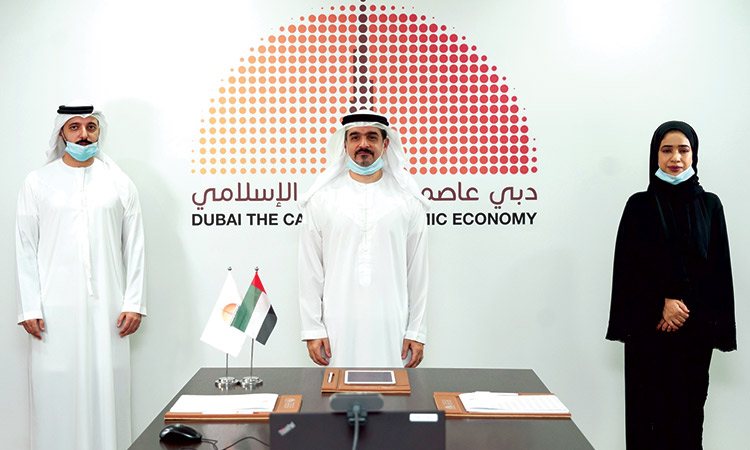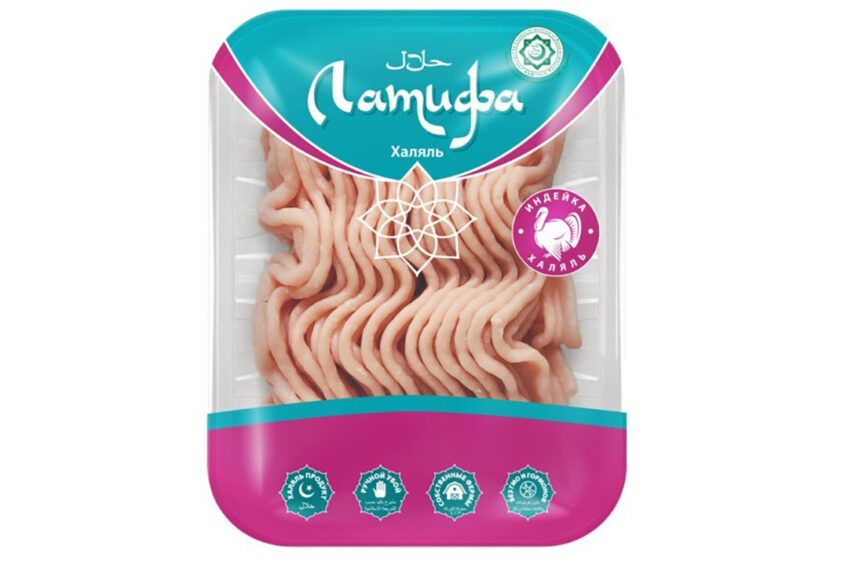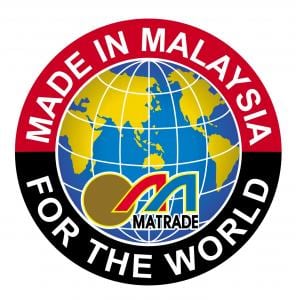Top officials during the signing ceremony.
Business Bureau, Gulf Today
Etihad Credit Insurance (ECI), the UAE’s federal export credit company, has partnered with Dubai Islamic Economy Development Centre (DIEDC) to boost UAE exports through sharia-compliant export credit solutions.
The agreement is in line with the vision and directives of His Highness Sheikh Mohammed Bin Rashid Al Maktoum, Vice President and Prime Minister of the UAE and Ruler of Dubai, who pointed out at the third Global Islamic Economy Summit, that the Islamic economy offers a real opportunity to find new ways of managing economic, commercial, and financial growth.
In a Memorandum of Understanding (MoU) signed by Abdullah Mohammed Al Awar, CEO of DIEDC, and Massimo Falcioni, CEO of ECI, the two organisations agreed to form a committee that will implement initiatives aimed at shoring up the UAE’s sharia-compliant exports. The number of members, the structure of the committee and the means of financing, as well as the schedule of meetings, the working mechanism and the decision-making process will be finalised by ECI and DIEDC.
The agreement is a result of the shared objectives of ECI and DIEDC to boost awareness for the Islamic economy globally and to strengthen the UAE’s position as the preferred global hub for halal exports.
As part of the agreement, the federal export credit company will support DIEDC’s partners through its trade credit services that can significantly augment their sharia-compliant exports. The two organisations will also partner with Islamic banks and exporters in projects that require export financing, structured trade finance, project finance, as well as supply chain finance.
Furthermore, the partnership is mandated to enhance awareness of Islamic trade credit and political risk solutions and financing structures (based on takaful) as well as to examine how ECI can provide DIEDC’s business partners with risk mitigating tools. In doing so, the two entities are seeking to drive the global competitiveness of these businesses to help them enhance their export competencies and penetrate new markets.
For its part, ECI will also participate in conferences, workshops, training courses and activities focused on exports and Islamic finance organised by DIEDC. In addition, ECI is to have access to the Centre’s reports and publications.
Speaking on the synergy, Abdullah Mohammed Al Awar said: “Through this strategic partnership with ECI, DIEDC seeks to create more opportunities in the Islamic economy space for UAE companies engaged in exporting sharia-compliant products, and to attract more export-focused investments.”
“This MoU opens new global markets for high-quality sharia-compliant products from the UAE that are already in great demand for complying with best-in-class standards,” he added.
Al Awar pointed out that this collaboration with ECI will further contribute to advancing the UAE’s leading position in the halal sector globally. The two entities are mandated to cooperate with strategic stakeholders in the UAE to launch initiatives that support halal products. In addition, they are to jointly host events that highlight the advantages of investing in the Islamic economic sectors.
Al Awar noted that the launch of the Halal Mark by Emirates Authority for Standardization and Metrology (ESMA) had increased the credibility of Dubai and the wider UAE as pioneers in the halal sector.
For his part, Massimo Falcioni expressed his confidence that the agreement will significantly bolster trade and investment opportunities for local businesses looking to export shariah-compliant products.
He said: “Through our sharia-compliant trade credit solutions, ECI stays true to its vision of supporting the growth of businesses that are aligned with the vision of the UAE leadership. We continue to implement our clear roadmap through achieving our goals in alliance with strategic partners both within and outside the country. Together with DIEDC, we aim to not only strengthen the efforts of halal exporters in the country, but also to facilitate the development of new products that will set benchmarks across sectors, and contribute significantly to positioning the UAE as the global leader in the Islamic economy.”
Dubai Islamic Economy Development Centre (DIEDC) was established in December 2013 under the supervision of Sheikh Hamdan Bin Mohammed Bin Rashid Al Maktoum, Crown Prince of Dubai and Chairman of the Dubai Executive Council, to transform Dubai into the capital of Islamic economy.
In 2017, DIEDC launched its refreshed Islamic economy strategy (2017-2021) that focuses on identifying new key performance indicators (KPIs) for monitoring the growth of three core Islamic economy sectors – Islamic finance, halal products, and Islamic lifestyle encompassing culture, art, fashion and family tourism – in addition to measuring their contribution to the UAE’s national economy. Knowledge, standards and digital Islamic economy serve as cornerstones that support these key sectors in achieving the leadership’s Islamic economy vision.
Etihad Credit Insurance (PJSC) was established by UAE Federal Government and its founders, the governments of Abu Dhabi, Dubai, Ras Al Khaimah, Fujairah and Ajman. The company started its operations in February 2018. ECI plays a catalyst role in supporting the UAE’s non-oil exports, trade, investments and strategic sectors development, in line with UAE Vision 2021 agenda.




